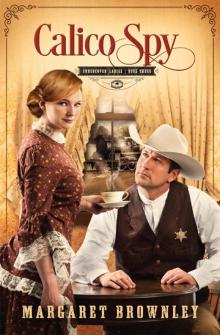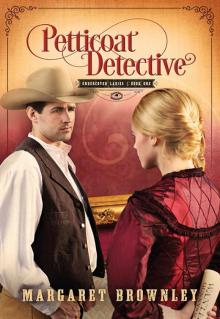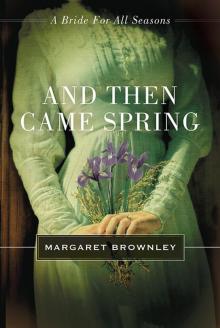- Home
- Margaret Brownley
The 12 Brides of Summer Novella Collection #3
The 12 Brides of Summer Novella Collection #3 Read online
The Dog Days of Summer Bride
by Margaret Brownley
Copyright
© 2015 by Margaret Brownley
eBook Editions:
Adobe Digital Edition (.epub) 978-1- 63409-576-1
Kindle and MobiPocket Edition (.prc) 978-1- 63409-575-4
All rights reserved. No part of this publication may be reproduced or transmitted for commercial purposes, except for brief quotations in printed reviews, without written permission of the publisher.
All scripture quotations are taken from the King James Version of the Bible.
This book is a work of fiction. Names, characters, places, and incidents are either products of the author’s imagination or used fictitiously. Any similarity to actual people, organizations, and/or events is purely coincidental.
Published by Barbour Books, an imprint of Barbour Publishing, Inc., P.O. Box 719, Uhrichsville, Ohio 44683, www.barbourbooks.com
Our mission is to publish and distribute inspirational products offering exceptional value and biblical encouragement to the masses.
Chapter 1
Bee-Flat, Kansas
1883
Seven-year-old Timmy Crawford looked up from the piano. “I don’t have enough fingers to play eighty-eight keys,” he complained.
Marilee Davis smiled down at her young student and straightened the sheet music. “But you have more than enough to play these three notes.” She demonstrated, calling the notes out loud. “C. . .D. . .E. . . . Now your turn.”
Timmy poked each piano key with his forefinger as if squashing ants at a picnic.
“That’s better,” she said, not wanting to discourage the boy. “Now try again using three fingers.”
This time Timmy got the fingering right but not the notes. Marilee was just about to correct him when her dog beat her to the punch. Shooting across the parlor in a black-and-white streak, his front paws landed on the ivory keys with a clash of dissonant chords.
Startled, Timmy cried out and almost fell off the piano stool.
Marilee pulled the dog away. “That’s enough,” she scolded. Naming him Mozart had been a mistake, though she called him Mo for short. All it did was put ideas in his furry head and make him think he was the music teacher instead of her.
“I’ll take it from here.” Her stern voice clearly showed she meant business. “Lie down!”
The dog’s black tail drooped like a wilted flower. With a soft whimper he circled three times and flopped on the rug with an audible sigh. Muzzle lowered onto crossed paws, he gazed up at her with woeful brown eyes.
Mo didn’t fool her a bit. Every doleful look and sorrowful gesture was an attempt to win her over, and nine times out of ten, it worked. But today her sympathy was with her young student, who stared at the dog with big round eyes.
“What’s wrong with him?” Timmy asked. “How come he jumped up like that?” This was only Timmy’s second lesson with Marilee, and he wasn’t used to Mo’s strange ways.
“Nothing’s wrong with him,” she said. Much. It was just her luck to get saddled with an eccentric, know-it-all cow dog. “He was just pointing out your wrong notes.”
Mo usually let out a couple of warning barks before attacking the piano, allowing her to grab him before he did any harm. Today he sprang without warning.
“How does he know I played the wrong notes?”
“He can hear them. I think it hurts his ears.” A tendril of blond hair escaped her tightly wound bun, and she brushed it away from her face. “So where were we?”
Timmy had taken lessons previously, but his original instructor had retired. The boy could barely play a scale let alone a simple melody, but that didn’t keep his mother from insisting he was a gifted musician. Her opinion was based on him cutting his first tooth on a banjo case.
“Start from the beginning.”
Timmy pulled his gaze away from the prone dog, swiped a strand of red hair out of his eyes, and scooted around to face the piano.
He really was a sweet boy, but with all his energy he would be better off playing ball with the other boys or cooling off in the nearby water hole.
Timmy hit another wrong note. Before Marilee could correct him, Mozart whimpered and covered his eyes with a paw. They were all three saved by the musical chimes of the grandfather clock. Mo rose on all fours, ears alert, tail wagging.
Marilee swore the animal could tell time. “That’s enough for today, Timmy.”
The boy didn’t have to be told twice. He slipped off the piano stool and cautiously circled the dog.
“He won’t hurt you,” she said. Mo really was all bark and no bite. Usually, she put him outside during lessons, but this was Friday, and that was always the day the dog ran off to parts unknown.
She handed Timmy his music book along with a little bag of penny candy. “See you next week. Don’t forget to practice.”
“I won’t.”
“And don’t let the dog out—”
Her caution came too late. No sooner had Timmy opened the door than Mo took a flying leap outside.
By the time Marilee stormed after him, Mo was halfway down the road. “Mozart!” she called, hands at her waist. “Come back this minute. Do you hear me? Now.”
Calling the dog back did no good. It never did.
“Sorry, Miss Davis.”
“It’s not your fault, Timmy.” Nothing could keep that dog from running off to God knows where every blasted Friday. Not even the high fence in back which he tunneled under with the ease of a child crawling under a bed.
Shading her eyes against the late-afternoon sun, Marilee watched until Mo was but a speck in the distance. For the love of Betsy, what was wrong with that crazy dog? She gave it a good home with lots of attention. So why the disappearing act?
Where he went was anyone’s guess. All Marilee knew was that when he came back he reeked like last week’s fish dinner.
If the unpleasant odor wasn’t bad enough, he also conveniently forgot everything she’d taught him and returned home with the manners of a hog. He jumped on her good furniture, begged at meals, and drank from unsavory places. Well, enough was enough!
Mo didn’t know it yet, but his wandering days were about to end. Marilee meant to see that he stayed put even if she had to keep him under lock and key every weekend from here to doomsday.
After watching Timmy race down the road to his house, she stepped back inside and closed the door. He was the last student of the day. Her work was over, and she was free to do. . .what? She sighed. She had two students on Saturday, but the only bright spot in the weekend was Sunday worship.
Without Mo the house seemed empty, and she sat down at the piano to fill the loneliness the only way she knew how. Closing her eyes, she let her fingers fly up and down the keyboard with the ease of rippling water. She lost herself to Chopin, Mozart, and Beethoven. She loved what the music helped her remember.
She loved even more what it helped her forget.
Chapter 2
Blacksmith Jed Colbert pounded the heated horseshoe into shape. Sparks flew with each clank of steel. He couldn’t remember a July so hot, and he paused for a moment to brush the perspiration from his forehead with his arm.
He held up the U-shaped metal piece with a pair of tongs. Satisfied, he tossed it onto a growing pile just as his friend Curly Madison walked in.
“Got any hub rings?” he asked.
“Over there.” Jed slanted his head toward a wooden box. “Sure is hot.”
“Yep, sure is,” Curly said, pawing through the metal parts. “It’s the dog days of
summer all right.” Anyone meeting Curly for the first time might think his name a joke, for he was bald as a newly shorn sheep, the unruly curls of his youth nothing but a fond memory.
Curly set two metal rings on the counter and dug into his trouser pocket for a handful of coins. “Where’s Dynamite?” he asked. Dynamite was Jed’s black-and-white cow dog. “Still taking off on you?”
“Yep, every Monday like clockwork.” Jed shook his head. “It’s the craziest thing. I can’t figure out where in the name of Sam Hill the fool dog goes. Who ever heard of a dog disappearing four out of seven days a week?”
Curly shrugged. “A dog gets something in his head and there’s no changing it. Take Barney, for example.” Barney was Curly’s terrier. “It’s been three years since I got him from his Catholic owner, and the dumb dog still refuses to eat on Fridays.”
“Is that so?”
“Crazy, uh? Have you tried keeping the dog tied up?”
Jed picked up a piece of rope from his workbench. “Chewed right through it.”
Curly shook his head. “It sure does look like he lives up to his name.”
Jed tossed the rope back on the bench. “It wouldn’t be so bad if he didn’t come back smelling of perfume.” Not that it was an unpleasant smell; not by any means. But it sure had caused him a wagonload of trouble.
The dog never failed to stink up the place, and the lavender-rose fragrance led Maizie Denton to jump to all the wrong conclusions. Now half the town considers him a womanizer and the other half wants to know his secret.
“Maizie still won’t have anything to do with me. She’s convinced I’m seeing other women.”
Curly commiserated with a shake of his head. “Maybe you don’t spend enough time with the dog. Maybe he seeks female companionship because he’s lonely.”
Jed hadn’t considered that possibility. “I take him fishing every week. What more could he want?”
“Beats me.” Curly palmed two coins on the counter and pocketed the rest. “I have enough trouble understandin’ me own dog.”
Just then a bark ripped through the air, and both men turned to the open double doors of the blacksmith shop.
“Speak of you-know-who,” Curly said.
Dynamite rushed into the shop and greeted Jed with wagging tail. “It’s about time you got here, boy.” Jed scratched the dog behind both ears.
Woof!
“Whoo-eeee.” Curly waved a hand in front of his nose. “It smells like a bordello in here.”
“What did I tell you?” Jed said. “I’ve asked around town and no one, including Madam Bubbles, knows anything.”
“All I can say is you better find out where Dyna spends his time or your love life will go to the dogs.” Laughing at his own joke, Curly picked up the two metal hub rings and hobbled out of the shop. “See you at church,” he called over his shoulder.
“See you.” Jed stared down at Dyna. The dog had caused him nothing but trouble of late. It all started around four months ago. One day Dyna was a perfectly contented and normal dog. Then without warning, he started his disappearing act, and it had been one thing after another ever since.
Thanks to Maizie, his undeserved reputation as a philanderer had resulted in a decline of business. Some customers even went so far as to take their smithy needs to the next town.
The way things were going he’d soon be bankrupt, and all because of one dumb dog.
By the time Marilee arrived at church that hot Sunday morning, the only place left to sit was next to that awful womanizing blacksmith, Mr. Colbert.
Mrs. Pickwick, president of the women’s auxiliary, had warned her and every other woman in town to stay away from him. To hear her tell it, the man was quite the lady-killer and no woman was safe from his roaming eye.
None of this particularly worried Marilee. She was quite capable of taking care of herself. At least where men were concerned. Still, sitting next to him in church could put a dent in her reputation. People tended to expect the highest moral standards from teachers, even those who taught music.
Bee Flat wasn’t an unfriendly town, but neither did it greet strangers with open arms. Some matrons seemed especially wary of single, independent women.
Until Marilee was fully established as a music teacher and had proven herself trustworthy, she would have to watch her step where men were concerned.
Mr. Colbert turned to look at her as she slid onto the pew next to him. A crooked smile followed a quick nod of his head.
Up close, the man was quite the looker, and it was all she could do not to stare. Eyes the color of cornflowers looked out from a rugged square face. A brown swag of hair dipped from a side part, partially covering his brow. Dazzlingly white teeth showed from beneath parted lips, and for some odd reason, her cheeks grew warm beneath his steady gaze.
Since it would be rude not to acknowledge him, she nodded likewise but refused to favor him with even a polite smile. A woman couldn’t be too careful around a man with his reputation. Looking away, she pulled off her kid gloves and accidently nudged his arm with her elbow.
“Sorry,” she mumbled and focused her gaze on the organist to the right of the altar. Her trained ear picked out a popular ditty amid the more somber notes.
Mr. Colbert leaned sideways and whispered in her ear. “My Irish Molly-O,” he said, naming the drinking song.
As if sharing a private joke, she met his smile with one of her own, and a moment of rapport sprang between them. She doubted that anyone else in the congregation had picked out the wayward tune. Not only did the organist have a sense of humor, but Mr. Colbert obviously had an ear for music. The clearing of a voice startled her into pulling her gaze away.
From the pew in front, Mrs. Pickwick shot her a disapproving look. Her boat-like hat would have looked more at home sailing across the deep blue sea. It made Marilee’s modest straw hat look almost too sedate in comparison.
No sooner had the last of the organ’s chords faded away than Reverend Hampton took his place behind the pulpit. An older man with gray hair and sideburns, he wore a black robe with winglike sleeves. “Let us pray.”
Closing her eyes, Marilee clasped her hands in her lap. During the silent prayer, she tried to concentrate on her blessings and not dwell on the lost dreams of her past.
“Amen,” the minister said and promptly began to preach on the dog days of summer. “Tempers flare as the mercury rises,” he expounded. “But what if we think of it as the inverted God days of summer? How would that affect our ways?”
It was an interesting concept, and Marilee was eager to hear more, but she was soon distracted. Next to her Mr. Colbert was sniffing like a bloodhound. Or was he sniffling?
She certainly hoped he wasn’t coming down with something. The last thing she needed was to catch a summer cold. She tried scooting closer to the aisle but was already as close to the edge as possible.
Mr. Colbert leaned sideways and his shoulder touched hers. “Your perfume reminds me of my dog,” he whispered.
Thinking she’d not heard right, she glanced at him. “I beg your pardon?” she whispered back.
“My dog,” he said. “You smell like my dog.”
Her mouth dropped open. Had she really heard what she thought she heard? She’d been warned about his womanizing ways, but nobody mentioned his lack of good manners.
He remained silent for the rest of the sermon except for an occasional sniffing sound. Whenever she thought it safe to do so, she stole a glance at him. Invariably, she found him looking back. At such times she quickly turned her head and continued to seethe. Like his dog, indeed!
The congregation stood for the closing hymn. As the last organ chord faded away, she jumped to her feet and scurried up the aisle.
Outside, she was stopped by the mother of one of her students who anxiously inquired about her daughter’s progress. Since it was neither the time nor place to discuss such matters, Marilee responded in general terms.
“Yes, Charlene is”—a sweet girl
but musically impaired—“coming along quite nicely,” she said. “Be sure to have her practice.”
If it wasn’t for mothers seeing genius where none existed, most music teachers would be out of business. Of course, the word genius was never used in describing female children. Domesticated was the best a girl could expect. The ability to play the piano was considered almost as important in landing a future husband as learning to cook and sew.
Not that it had helped Marilee. If anything, her ambition to play in an orchestra had proven to be a detriment in matters of the heart. No man was interested in a woman with such lofty ambitions. At the age of twenty-four she’d reached a dead end in both a marriage prospect and her dream of playing in a symphony orchestra.
While calming the anxieties of yet another student’s mother, she saw Mr. Colbert step outside the church and head her way. Since he stood taller than most of the other men, it was hard not to notice his commanding presence.
He caught up to her just as she reached her springboard wagon. “Your glove,” he said.
“Oh.” She took the offered glove from him. Perhaps he wasn’t completely without manners. Since he towered over her by a good six inches she was forced to look up. “Thank you.”
“I fear we may have gotten off on the wrong foot,” he said.
She drew on her glove and wriggled her fingers into the silky depths. “The wrong foot?”
“In church.” He hesitated a moment. “I didn’t mean to offend you.”
“You mean by telling me I smelled like your dog?” she said, her voice cool.
He lowered his head and rubbed the back of his neck. “I meant it in a good way,” he said and grinned.
She wasn’t sure if it was the sheepish look or the crooked smile, but her irritation melted away like wax from a candle. “In that case, I guess there was no harm done,” she said.
A look of relief crossed his face. “I don’t think we’ve ever been formally introduced.” He doffed his wide-brim hat. “I’m Jed Colbert.”
Behind him Mrs. Pickwick stopped to stare, her pointed face dark with disapproval.

 The Outlaw's Daughter
The Outlaw's Daughter Waiting for Morning (The Brides Of Last Chance Ranch Series)
Waiting for Morning (The Brides Of Last Chance Ranch Series) Do You Hear What I Hear?
Do You Hear What I Hear? The 12 Brides of Summer Novella Collection #3
The 12 Brides of Summer Novella Collection #3 Calico Spy
Calico Spy Cowboy Charm School
Cowboy Charm School A Lady Like Sarah
A Lady Like Sarah A Match Made in Texas
A Match Made in Texas Left at the Altar
Left at the Altar Petticoat Detective
Petticoat Detective And Then Came Spring
And Then Came Spring Log Cabin Christmas
Log Cabin Christmas Four Weddings and a Kiss
Four Weddings and a Kiss Dawn Comes Early
Dawn Comes Early